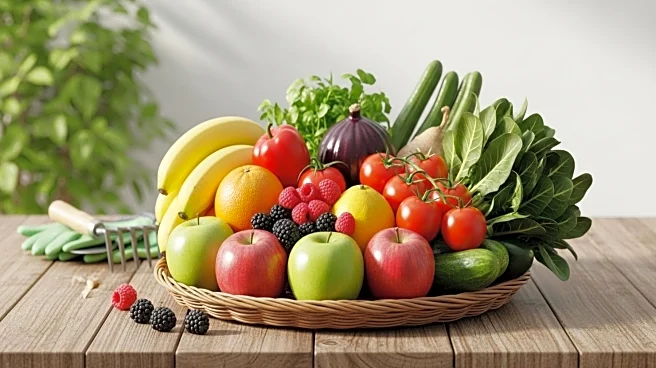What is the story about?
What's Happening?
Oman's self-sufficiency in the food sector has reached 65.8% by the end of the 10th Five-Year Plan and the First Executive Plan for Oman Vision 2040, according to the National Center for Statistics and Information (NCSI). The self-sufficiency rate is distributed across agriculture, fisheries, livestock, and food and beverage industries. Notably, the fisheries sector achieved a self-sufficiency rate of 146%, while agricultural products stood at 49.4%, animal products at 87.3%, and food and beverage industries at 66.4%. Dr. Yousef bin Mohammed al Riyami, Director-General of Statistics at NCSI, highlighted that several key food commodities have surpassed the 75% self-sufficiency mark, including fish, cucumbers, dates, and milk. However, some commodities like poultry, coconuts, and red meat remain below this threshold.
Why It's Important?
The increase in food self-sufficiency is significant for Oman as it enhances national food security and reduces dependency on imports. This development is crucial given the natural, geographical, and demographic challenges the country faces, such as high temperatures, limited water resources, and constraints on agricultural expansion. The food and water sector's contribution to the national economy is also noteworthy, with a 3.5% contribution to GDP in 2024, up from 3.2% in 2023. The growth in self-sufficiency supports economic stability and resilience, particularly in the face of global supply chain disruptions and rising food prices.
What's Next?
Oman is likely to continue its efforts to improve food self-sufficiency by addressing the challenges identified, such as expanding cultivated areas and enhancing water resource management. The government may also focus on increasing the efficiency and productivity of the agricultural sector to further boost self-sufficiency rates. Continued investment in the food and beverage industries and the fisheries sector could also play a role in achieving higher self-sufficiency levels in the future.
Beyond the Headlines
The push for greater food self-sufficiency in Oman reflects broader regional trends in the Gulf Cooperation Council (GCC) countries, where food security is a strategic priority. This initiative may also have cultural implications, as it encourages the consumption of locally produced goods and supports traditional agricultural practices. Additionally, the focus on self-sufficiency aligns with global sustainability goals by promoting local production and reducing the carbon footprint associated with food imports.















